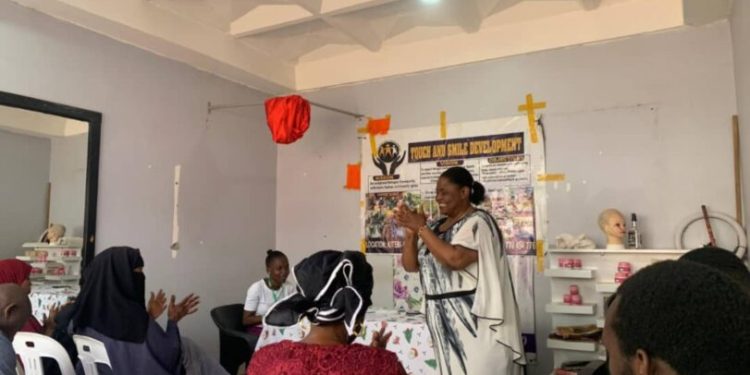In Uganda, thousands of deaf women continue to face silent suffering as they struggle to access healthcare due to the absence of sign language interpreters in hospitals.
Despite progressive policies, many still experience exclusion, miscommunication, and neglect when seeking treatment, particularly for sexual and reproductive health services.
For Annet Kissa, a deaf mother of two, visiting a hospital is often an exercise in frustration and isolation.
“I only go when my children are sick or during antenatal visits,” she says through gestures. “But even then, doctors do not understand me. I use signs and facial expressions, but it’s hard.”
Without interpreters, many deaf women like Kissa leave hospitals without understanding their diagnosis or medication instructions. Some, she says, simply stop going for care altogether.
“I sometimes pay extra to go to private hospitals, hoping to be understood. But it’s too expensive. We need sign language interpreters in public hospitals so that we can communicate clearly,” she adds.
Hindu Luyinda, another deaf woman, says that silence also extends to taboo topics like sexual and reproductive health.
“Most deaf women do not talk about family planning or sexual health because there’s no safe space,” she explains. “Even within our community, people are shy or misinformed. Some don’t know that using two condoms is dangerous or that emergency pills cannot be taken regularly.”
Her experiences reveal how misinformation and stigma thrive where communication fails.
Irene Okyo, a deaf mother of two, has never tested for HIV — not because she is unwilling, but because of fear and poor communication.
“When I go for antenatal care, I have to bring my brother to interpret,” she says. “Without him, I miss out on important information. Sometimes the nurses write notes, but it’s not enough, especially for private issues.”
She believes teaching sign language in schools and training health workers would transform lives.
“If more people could sign, we would be understood. We deserve that respect and access,” she says.
Uganda’s Sign Language Policy (2017) requires the inclusion of sign language services across sectors. However, implementation has been painfully slow.
According to the Uganda Bureau of Statistics, about 1.2 million Ugandans live with hearing impairments — the majority being women — yet very few public health centers employ interpreters.
Esther Kyozira, CEO of the National Union of Disabled Persons of Uganda (NUDIPU), says the lack of accessible information in the health sector remains a major challenge.
“Most deaf people rely on sign language, yet hospitals mostly use written posters or spoken communication,” she says. “Expecting patients to bring their own interpreters is not sustainable. We need government-employed interpreters in all major hospitals.”
Kyozira adds that NUDIPU is working with partner organizations to raise awareness and push for inclusive policy enforcement.
Emmanuel Ainebyona, spokesperson for the Ministry of Health, says the government is aware of the challenge and is taking steps to address it.
“In the new health structure, we are planning to recruit sign language interpreters at all levels — national, regional, and district hospitals,” he said. “The goal is to make healthcare inclusive for everyone, including people with hearing impairments.”
However, he admitted that budget constraints have slowed recruitment efforts.
Health workers say they often rely on relatives to interpret for deaf patients. Ramla Faraji, a Village Health Team member in Makindye, notes that this method is unreliable.
“We use family members to interpret, but it’s not ideal, especially for private medical issues,” she says. “Sometimes we write messages, but that doesn’t always work.”
Dr. Gerald Karuhanga, a gynecologist at Praise Medical Centre, agrees. “When patients can’t express their symptoms, it affects diagnosis and treatment. We need interpreters in hospitals,” he said.
Civil society groups like the Sexual Reproductive Health and Rights (SRHR) Alliance Uganda and the Uganda Red Cross are also working to fill this gap.
The Red Cross, for instance, has started training its staff in basic sign language and collaborating with Ntinda School for the Deaf to promote inclusion in health outreach programs.
Experts believe that bridging the communication gap will not only improve healthcare but also uphold the dignity and human rights of people with hearing impairments.
“The inclusion of sign language in schools, universities, and hospitals should be treated as a national priority,” says Miranda Bagamba from SRHR Alliance Uganda. “Communication is part of care. Without it, people suffer in silence.”
The stories of Kissa, Hindu, and Irene reveal a larger truth: for Uganda’s deaf women, access to healthcare is not just about medicine — it’s about being seen, heard, and understood.
As Uganda moves toward universal health coverage, advocates urge the government to institutionalize sign language interpreters, train medical staff, and integrate inclusive communication into public health policy.
Until then, thousands of deaf women will continue to live in a world where silence can be deadly — a world that urgently needs to listen.



